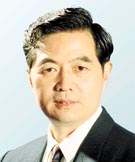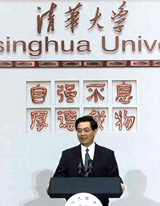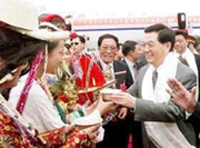|
Hu Jintao -- Politburo Standing Committee Member of CPC Central Committee 
|
| 2002-09-09 13:25:48 |
 Hu Jintao (1942- ), native of Jixi, Anhui Province. Hu Jintao (1942- ), native of Jixi, Anhui Province.
Vice President of the People's Republic of China; Vice Chairman of CPC Central Military Commission and PRC Central Military Commission; Standing Committee member of the Political Bureau, and member of the Secretariat, of 15th CPC Central Committee; President of CPC Party School.
Hu, who had aspired to be an engineer in the field of water conservancy and hydroelectric power generation, became the youngest member of the CPC Central Committee in 1982, when he was 39.
At the age of 44, he became secretary of the CPC Guizhou Provincial Committee, again the youngest among his peers. At the end of 1988, Hu was appointed secretary of the Tibet Autonomous Regional Party Committee.
Hu's rapid elevation through the Party's echelons is a reflection of the Party's long endeavour to cultivate and promote young cadres.
He once said success in life "requires resolve, attention to concrete matters and courage in making decisions."
In 1982 he served as secretary of the Gansu Provincial Committee of the Chinese Communist Youth League. Transferred later to Beijing, he became member of the Secretariat of the Central Committee of the Youth League and president of the All-China Youth Federation, and headed the Youth League Secretariat in November 1984.
 A Brilliant student of the prestigious Qinghua University majoring in hydraulic engineering, Hu joined the CPC in 1964. He became a political instructor at his alma mater upon graduation in 1965. He gained experience in grassroots practical work. In 1968 he was transferred to the Ministry of Water Resources and Electric Power and, in 1974 to Gansu Province where he served as deputy head of the Project Design Management Division of the Provincial Construction Commission. During the period he took part in the construction of two hydroelectric power stations in the upper reaches of the Yellow River.
A Brilliant student of the prestigious Qinghua University majoring in hydraulic engineering, Hu joined the CPC in 1964. He became a political instructor at his alma mater upon graduation in 1965. He gained experience in grassroots practical work. In 1968 he was transferred to the Ministry of Water Resources and Electric Power and, in 1974 to Gansu Province where he served as deputy head of the Project Design Management Division of the Provincial Construction Commission. During the period he took part in the construction of two hydroelectric power stations in the upper reaches of the Yellow River.
The technical and economic work familiarized himself with management and that work related to the communist youth league had also contributed to an improvement of his abilities, and reminded himself being an official should work for the well-being of the people in an area where he works.
 As secretary of the Party's Guizhou Provincial Committee, Hu traveled extensively for personal investigations, leaving his footsteps in all the 86 counties and cities of Guizhou. During his four-year stay in Tibet, Hu, braved the plateau region's hostile natural conditions including a shortage of atmospheric oxygen, visited many areas and established extensive contacts with people from different walks of life there, contributing effectively to unity, stability and development in Tibet.
As secretary of the Party's Guizhou Provincial Committee, Hu traveled extensively for personal investigations, leaving his footsteps in all the 86 counties and cities of Guizhou. During his four-year stay in Tibet, Hu, braved the plateau region's hostile natural conditions including a shortage of atmospheric oxygen, visited many areas and established extensive contacts with people from different walks of life there, contributing effectively to unity, stability and development in Tibet.
Long years of work in remote and poor areas inhabited by ethnic minorities have tempered Hu's character as well as made him a staunch supporter of the policies of reform and opening-up.
He was elected member of Secretariat of CPC Central Committee in Oct. 1992; became president of CPC Party School in 1993.
Hu was alternate member of the 12th CPC Central Committee, and was elected and reelected member of 13th to 15th CPC Central Committees.
Hu Jintao was elected member of the Standing Committee of the Political Bureau of the CPC Central Committee at the First Plenary Session of the Party's 14th Central Committee in October 1992. In 1997, he was reelected member of Standing Committee of Political Bureau, and member of Secretariat, of 15th CPC Central Committee.
Hu was elected member of the Standing Committee of the National Committee of the Chinese People's Political Consultative Conference, and deputy (Guizhou Provincial Delegation) to 7th, 8th, and 9th NPC.
Hu Jintao was elected Vice President of the People's Republic of China at the first session of 9th NPC, March 1998.
Hu was appointed Vice Chairman of CPC Central Military Commission on Sept. 22, 1999.
Hu was appointed Vice Chairman of PRC Central Military Commission on Oct. 31, 1999.
|
|










